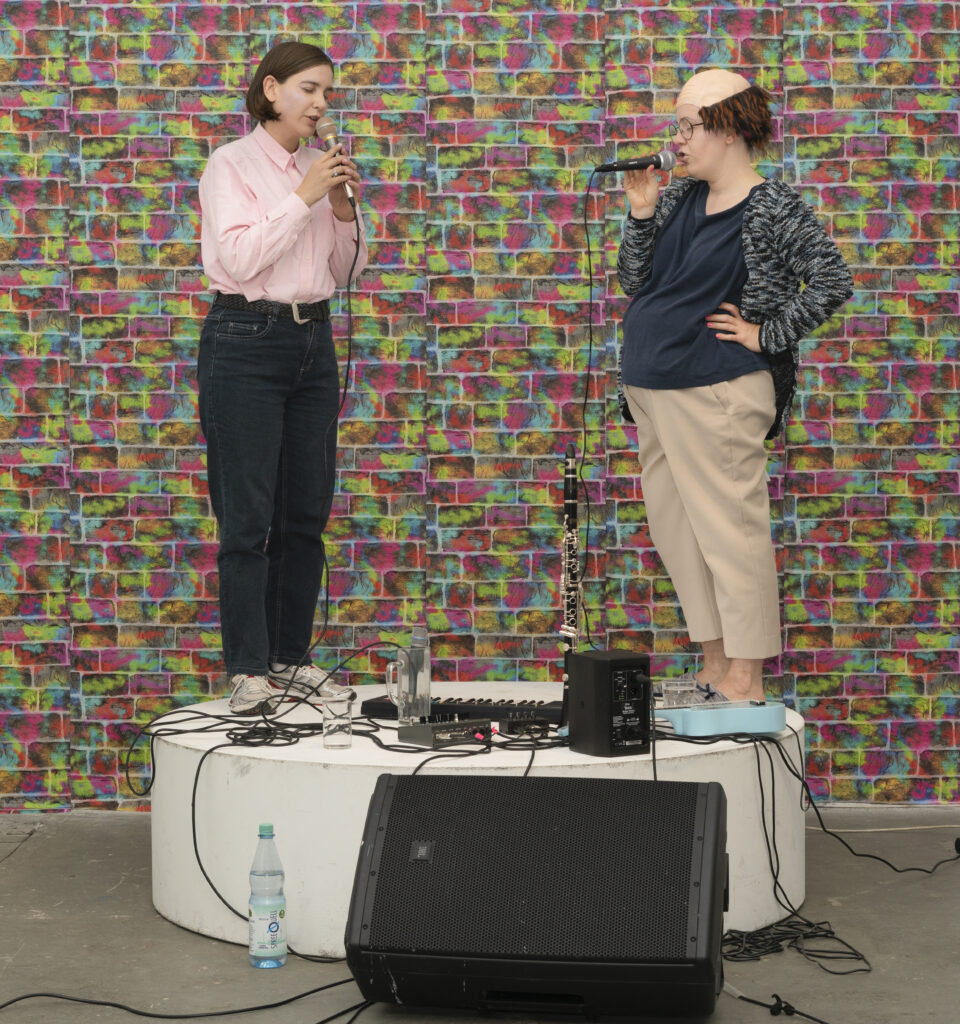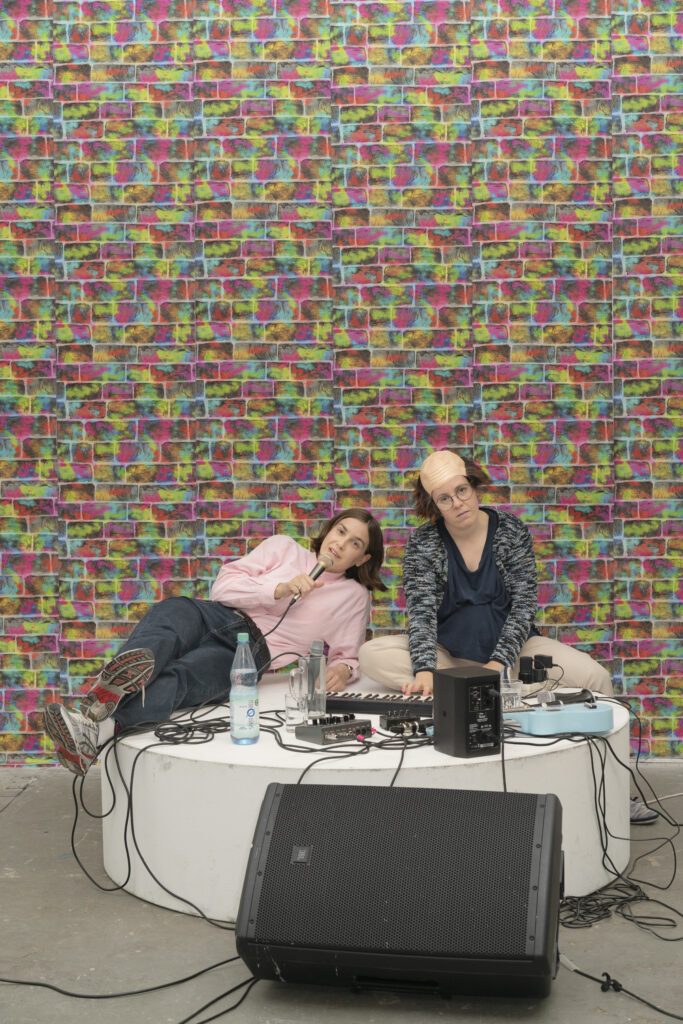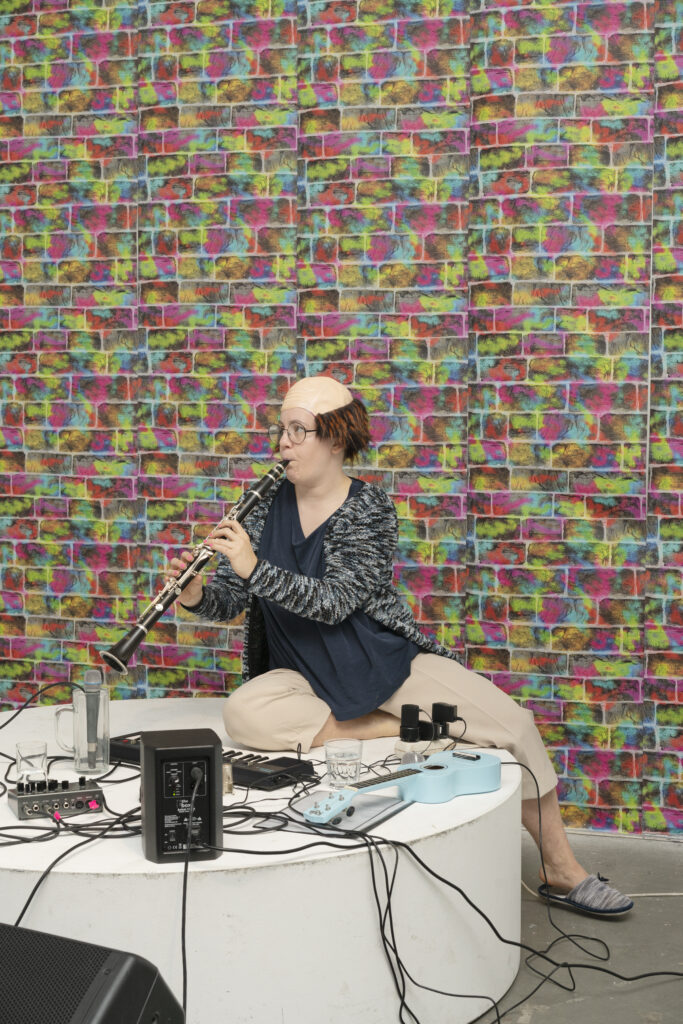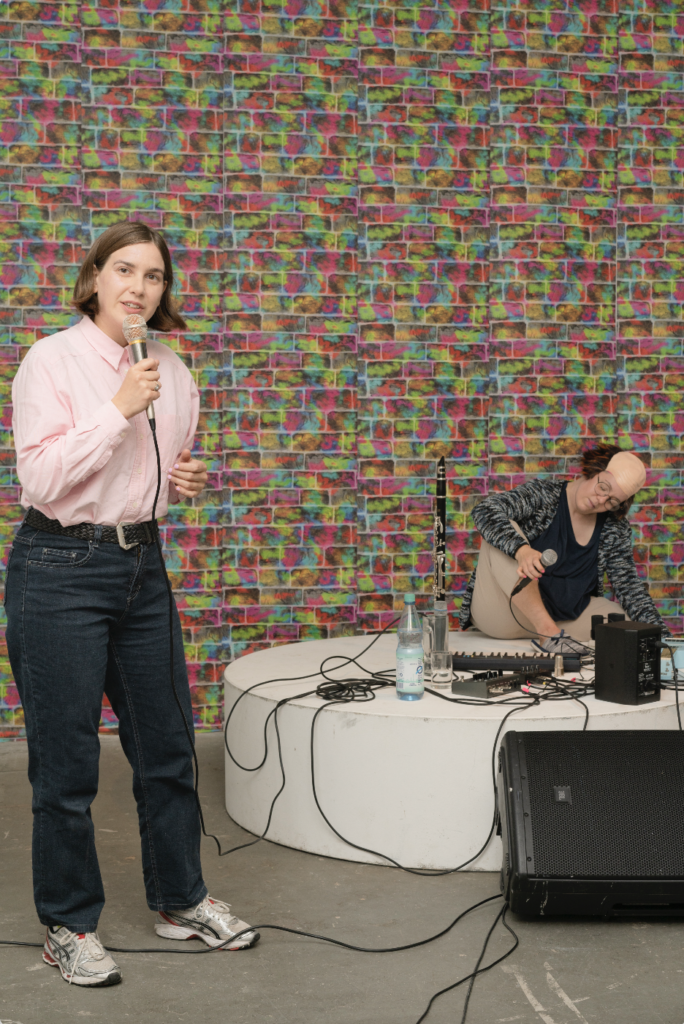Who’s afraid of Emotional Channel?
The smile that we, the audience, get from Anna Łuczak when she looks at us from the stage of the Apartment Project space in Berlin is a little too big to be true. There is something sad in this too-big smile, a futile devotion to the audience’s attention, as if it was already lost. She starts the night with an apology about her anticipated lack of performing skills: “We are a little rusty.” A self-conscious, self-critical comedian, a tragic one, almost like a sad clown, who already apologizes about their mishaps that didn’t even happen, yet.
When Angelica Falkeling enters the stage, it becomes clear that the two performers are not comedians, but artists who are only presenting themselves as comedians. The two tragicomic characters are talking about their equally glamorous, equally precarious lives. This identification becomes firmer as concrete stories are told, about unbearable part-time jobs, debts to the bank, and the privilege that lies behind many people’s decisions to become artists, to dare to choose the (seemingly) precarious. But the self-conscious-comedian quality does not disappear from the performers’ facial expressions when they reveal themselves as artists, and soon I understand why: the two professions, life practices, are not so different from each other after all. Maybe the circus of the art world is also not so different from the circus that clowns call their home? Or from the comedian’s stage, which allows focus, the feeling of fame for a brief moment, but is also so uncertain, so unsafe: one frantic performer at the audience’s mercy.
In the performance Temporal Comfort by Emotional Channel, we are confronted with the whole range of comedy in all its touching abysmal possibilities. Emotional Channel are Angelica Falkeling and Anna Łuczak. Their comical smiles are strained, their emotion is the result of hard work. But are they actually artists performing comedians – or the other way round?
Emotional Channel – the name is as precise as it is ambiguous. What channel are they talking about? A television channel? A birth channel? A river, a flow, a stream? A stream of what? Of associations, of language, of music? And what is being channeled through the Emotional Channel? Desire? Feelings? Or critique? What emotions are at stake? Those of the audience or those of the artists? And in which direction? Is it about the emotions they have or the ones they would like to create? Or is it an emotional feedback loop?
“If you say you are broke, how much money do you have on your bank account?” they ask provocatively, right at the beginning, exposing the partial indistinguishability of the precarious and the privileged. Most of those present in the audience are artists, and my gaze goes immediately in the direction of those sitting next to me. What are their faces, their masks, revealing? Do they recognize themselves or not? Both parties of us, now performing, spectators are equally uncomfortable. Shortly after, one of the two comics says, “I hate running into people I know in the grocery store,” and directly I feel caught and wonder why. Because I can afford what I can afford, or because I cannot afford what I cannot afford? Or both, one after the other? It depends on who I run into, I guess. But what is being revealed here? The relativity of my own social status?
For a while, in one of my precarity-meets-privilege side jobs, I worked as a ghost writer for an artist who lived in a gigantic, heated-marble floored condo in a posh district of Berlin. I archived her vacation photos from Saint Tropez and wrote concept texts and applications for her, usually emphasizing her feminist approach. I was paid well (and not credited) for this, but never once saw her win one of the competitions or receive one of the grants. One work that was particularly important to her was a series of impressions of her buttocks, molded in clay. They were colorfully glazed and placed in a circle, as if in a meditative arrangement, in conversation with each other. Her own asses talking to each other.
I’ve always found this gesture of ass imprinting to be an act attempting immortalization, acceptance in an art world that this artist never really got access to, despite all the money.
Buying yourself the ability to occupy space to spread out your ass.
“Irony is over,” that artist once told me, “we live now in the time of the sincerity turn.” For her, irony being over also meant that she hoped criticism might be over, because criticism could only negatively effect her. Irony is indeed a distancing technique, but it also represents an analytical tool that sometimes the needy ones need. “Irony is over,” also means here, that a rich person protects her privilege.
Emotional Channel make themselves vulnerable by admitting to wanting something – at the risk of not getting it. Not admitting your own neediness is a position of safety, a comfortable one, but it is also a position in which you have already lost – because you have never really tried to reach out for your desire. The non-ironic vulnerability of Anna Łuczak and Angelica Falkeling allows them to leave another kind of ass imprint with their performance; an uncomfortable one, in the best sense. “Here we are,” they say, with performed, shy, self-confidence, while taking the social space they don’t have and daring to raise their voices without asking permission. A futile devotion to their own wants and needs – futile but passionate.
“Happy people practice gratitude,” the two sad, emotional artists-as-comedians say at the end of their performance, with tense smiles. And then they repeat it a good ten times, as if hoping they’ll start believing it themselves if they just say it often enough. Is that ironic? Yes. But it’s also captivatingly honest, tragicomic, and immediate in the vulnerability of its futility. The two are sincere and, simultaneously, engaging in serene and deadly serious criticism. Maybe that’s what’s emotional about Emotional Channel? They take up space and claim a place, in society, on the fringes of society, at society’s expense, for society’s benefit. And they do it with a high level of entertainment, for themselves and for their audience.
Afterwards, in front of the door of the Apartment Project space, an eight-year-old girl who had also been at the performance shows me how well she can make bubbles of chewing gum. She performs the skill with virtuosity. Her bubbles are pink and almost as big as her head. The girl hands me a piece of gum and asks me to try as well. I fail miserably; even as a child I was never able to do this task. Instead, I show her what I showed the other children in the schoolyard to make up for my failure – that I can squint particularly well. We look at each other (me, cross eyed) in our feats and smile at each other, a little tense, but with admiration. The shared silliness shows respect; two clowns who recognize each other in the distorted face of the other and are happy to differ in their equally respectable tasks.
text by Olga Hohmann, edited by Cannach McBride
Temporal Comfort (Angelica Falkelin & Anna Łuczak) Emotional Channel in Apartment Project, Berlin. 25.08.2021
The two artists have been claiming the unwanted space of the entertainer by studying comedy writing and stand-up delivery. It is the world premiere of their first and maybe only ever duo stand-up show presented as a performance. They know there are many out there who are keen to try, to deliver a punchline, and maybe they hide in the art closet. Emotional Channel mocking the binary lines of the professional and private life. In this stand-up set, they tap into their miserable joy and vulnerable privileges. The two artists first got to know each other during an exhibition trip. For reasons that can not be shared, it turned out more turbulent than expected. They started working together, presenting exhibitions, performances, a pop-up store, a Milk Bar, and most recently, an online yoga practice. During their rehearsals prior to the Apartment Project, they followed online guidance. More experienced entertainers, such as Jerry Seinfeld and Jonatan Unge taught them about jokes, writing methods, and memorizing techniques. Temporal Comfort is anecdotal in its structure; it is a severe piece of comedy. Funny by nature, serious in attitude.
photos by Jakob Forster
graphic design by Roxanne Maillet







